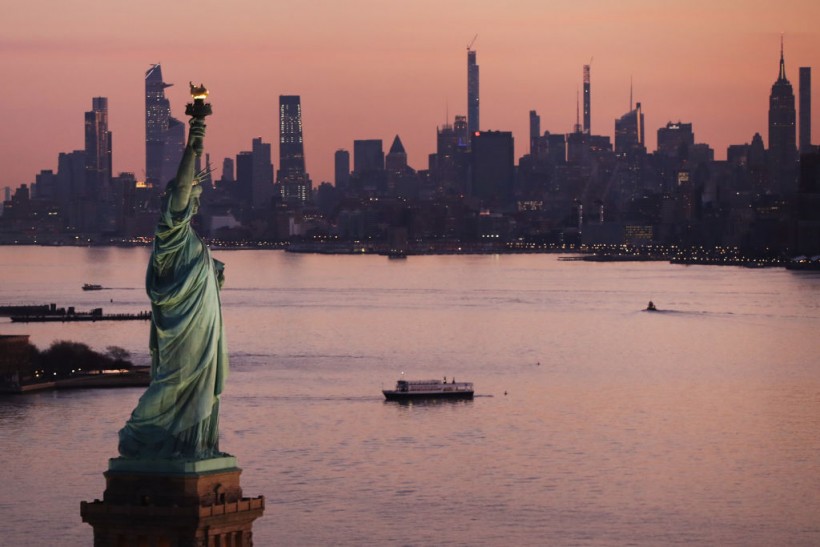Experts say a new COVID-19 strain circulating across New York City has mutations that could weaken vaccinations' efficacy. The said variant first emerged in samples taken in New York City in November.

NEW YORK, NEW YORK - MARCH 18: Dawn breaks over The Statue of Liberty as Manhattan and the nation struggles to contain the number of coronavirus cases on March 18, 2020, in New York City. Across the city, businesses, schools, and places of work have been shutting down, leading to empty streets and quiet neighborhoods. New York City mayor Bill de Blasio has threatened to call for a 'shelter-in-place' order as Manhattan continues to see a rise in cases of the virus. Worldwide, 200,000 people have now contracted COVID-19.
The California Institute of Technology (Caltech) and Columbia University studies said this new B.1.526 variant could dampen the existing vaccines' efficacy.
While both results have not yet been peer-reviewed, experts not involved in either study called the findings problematic. However, Dr. Max Gomez of CBS2 told CBS New York that vaccine firms are looking into the case.
Below is everything we know about the study, the mutation, and how it could affect the New York pandemic nearly a year after the coronavirus first inundated the region.
New York COVID-19 Variant: What's The New Strain?
The variant, known as B.1.526, started showing in samples obtained in New York City in November. In a database known as GISAID, Caltech researchers searched for mutations within hundreds of thousands of COVID genetic sequences to graph its growth.
The Caltech team found that B.1.526 cases had risen to 27 percent of the database's viral sequence in mid-February. Meanwhile, Columbia researchers sequenced 1,142 samples from patients at the university hospital. They discovered that 12% had an E484K case, one of the two forms that make up B.1.526.
ALSO READ: Local Coronavirus Strain May Be Fueling Surge in California, Experts Say
One of the Columbia researchers, Dr. David Ho, noted that cases in Westchester, the Bronx, and Queens indicate that the new version is active in some population dissemination. "It's not a single outbreak," he told the New York Times.
How could the strain affect the current vaccines?
Researchers at Caltech and Columbia found that the strains found in New York feature mutations infiltrate into host cells and more effectively cause infections. According to the New York Times, B.1.526 is essentially two variants, including a couple of common mutations known as E484K and S477N, which could influence how closely the virus binds to human cells.
"It's not especially happy news," Rockefeller University immunologist Michel Nussenzweig told the New York Times. The expert noted that learning about it is nice because experts will do more about the current pressure. The mutation blocks the action of a particular class of antibodies, Nussenzweig also said. He said it is very likely that people who have recovered from coronavirus or who have been vaccinated will be able to fend off this variant. There is no question about it. He added that they could get ill from it a little bit.
What other new COVID strains are circulating in New York?
The report on the fresh mutants in New York was made public the same week that it was revealed that experts proved the South African version to have two inhabitants of Nassau County. The Columbia team has reported that New York City has identified six cases of the U.K. variant, two Brazilian variant cases, and one South African variant case.
The fact that the coronavirus is changing in identical forms on different continents, both containing the E484K mutation in the New York, Brazilian, South African, and British strains, indicates that the mutations have resulted in the virus spreading more efficiently.
And although a two-dose Pfizer shot regimen has been shown to protect 90 percent of those inoculated against the U.K. and South African strains, the virus mutation over the last year indicates that when the coronavirus becomes a part of life on Earth, vaccination will continue to be modified for the long term.
RELATED ARTICLE: Coronavirus Survivors Twice as Likely to Develop Mental Disorders - Study
Check out more news and information on COVID-19 on Science Times.














